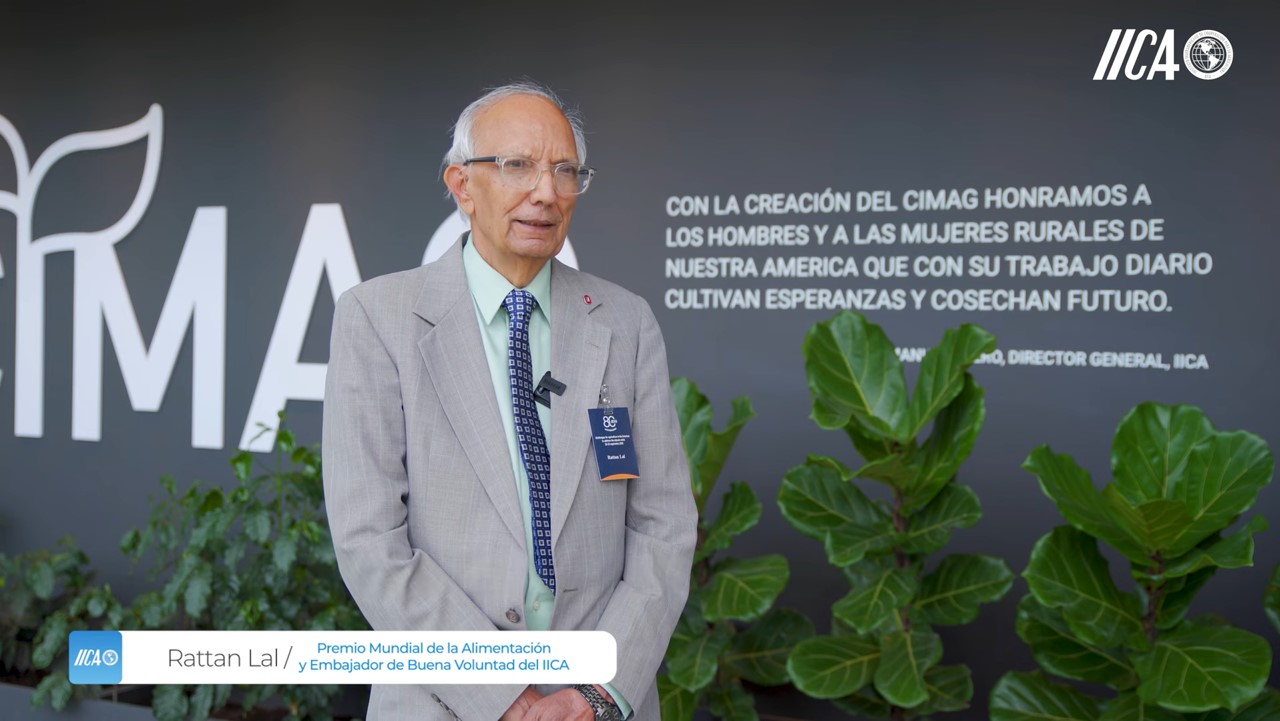At the upcoming COP27, Rattan Lal and the Director General of IICA, Manuel Otero, will spearhead the Institute’s support for the efforts of the countries of the Americas to ensure that agriculture’s voice is heard loud and clear on the global stage of the climate discussions.

San Jose, 1 November 2022 (IICA) – As human beings, we cannot do without agriculture, the main source of food. Food is a basic human right, but its production depends on healthy soil. So says Rattan Lal, a scientist regarded as the world’s leading authority on soil science and the Special Envoy of the Inter-American Institute for Cooperation on Agriculture (IICA) to COP27, the UN Conference of the Parties, the world’s most important annual meeting on climate action.
According to 2020 World Food Prize Laureate Lal, soil can also become a sink for atmospheric carbon and limit global warming, provided that we translate science into action.
“Hopefully, COP27 will help us do that,” the Director of Ohio State University’s Carbon Management and Sequestration Center (C-MASC) and IICA Goodwill Ambassador said.
At the upcoming COP27 of the United Nations Framework Convention on Climate Change (UNFCCC), Rattan Lal and the Director General of IICA, Manuel Otero, will spearhead the Institute’s support for the efforts of the countries of the Americas to ensure that agriculture’s voice is heard loud and clear on the global stage of the climate discussions.
For IICA, agriculture is a key part of the solutions to climate change, based on farmers’ management of natural resources and the tools that science and innovation provide.
“Farmers everywhere are the greatest stewards of the land. There are more than 500 million small farmers, so farmers are the major implementors of the concept of how to make agriculture a solution to climate change. Our policies at all levels ¾at district, county, state, national, regional and international level¾ must be pro-farmer, pro-agriculture and pro-nature,” Rattan Lal stated.
In Costa Rica in September, IICA’s Special Envoy to COP27 took part in a meeting during which the Ministers of Agriculture of the Americas reached agreement on the messages that will be shared at COP27, underscoring the importance of the agriculture sector and why it must play a leading role in global efforts aimed at climate change adaptation and mitigation and resilience-building.
“The concept I propose is farming carbon. When farmers, land managers, ranchers and plantation managers can grow carbon in the land, in the trees and soil, and be rewarded. Just as they can sell milk, poultry, beef, corn and soybean, they should also be able to sell carbon, so that it becomes a commodity,” the scientist added.
“Can the commodity of carbon in soil be given a price that is fair, just, transparent for farmers? Most of the money that is allocated for that price should really go to farmers. That would help us translate science into action and make agriculture a solution to climate change,” he concluded.
At COP27, IICA and its international partners will be setting up a pavilion bearing the name “The House of Sustainable Agriculture of the Americas” under the slogan “Feeding the world, nurturing the planet,” where nearly 60 high-level political and technical events will be held. The pavilion will be used to share examples of good practices, initiatives and lessons learned in the Americas aimed at making global agriculture more sustainable.
In various forums organized by IICA in recent months, Rattan Lal has highlighted the need for the work of farmers to be respected as an occupation that is vital for food and nutritional security.
More information:
Institutional Communication Division.
comunicacion.institucional@iica.int











